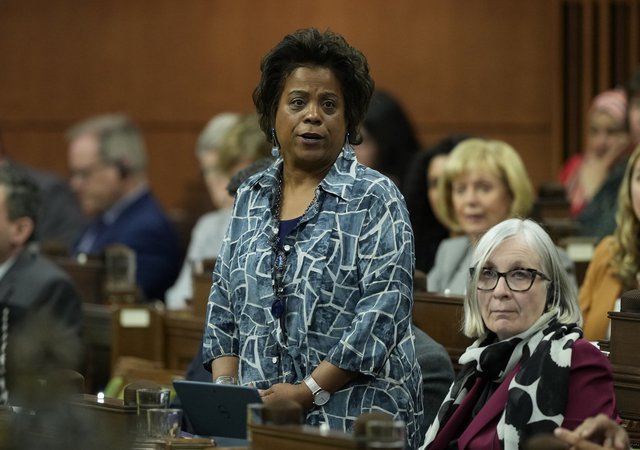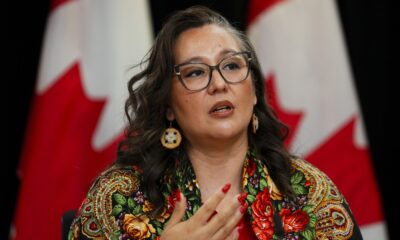Health
Health Minister Remains Uncertain on Pharmacare Deals with Provinces

Federal Health Minister Marjorie Michel has refrained from committing to new pharmacare funding agreements with all provinces and territories. This statement follows the passing of the first phase of the pharmacare law by the Trudeau Liberals last fall, which mandates the federal government to cover costs for contraceptives and diabetes medications.
Previously, the federal government signed agreements with Prince Edward Island, British Columbia, Manitoba, and Yukon before the spring election. During the election campaign, the Liberals assured voters of their intention to uphold the pharmacare program alongside other social services.
Government’s Position on Future Agreements
At a recent press conference in New Brunswick, Michel was asked about the lack of progress in negotiations with the remaining provinces. She highlighted that this is a new government operating in a different context. A spokesperson for the minister confirmed that the government intends to maintain the agreements already established but did not clarify whether new agreements would be forthcoming.
“Our new government will be there to discuss with our provincial and territorial partners how we can support them for better health outcomes for Canadians,”
said Emilie Gauduchon-Campbell in an email statement.
The Canadian Health Coalition emphasized that the last federal budget allocated $1.5 billion for these agreements, with the Liberals committing to sustain the pharmacare initiative during their election campaign. National Director of Policy and Advocacy, Steven Staples, expressed concern, stating, “I don’t think anybody voted for cuts to health care, including pharmacare.”
The NDP, which advocated for the creation of the pharmacare program through a previous agreement with the Trudeau government, criticized the current administration for potentially breaking a campaign promise. Interim leader Don Davies called on Prime Minister Mark Carney to expedite the finalization of agreements with all remaining provinces and territories, ensuring the funding promised is allocated. “No Canadian should have to choose between life-saving medicine and putting food on the table,” he stated.
Provincial Responses and Future Outlook
Michel’s comments were initially reported by the Telegraph-Journal, which cited an interview with New Brunswick Premier Susan Holt. Holt indicated that her government has not received communication from Ottawa since the election, despite campaigning on a promise to cover contraceptive costs. As of now, New Brunswick has yet to sign a pharmacare agreement.
Former Health Minister Mark Holland had previously indicated that time constraints might hinder negotiations prior to the election, which many polls suggested would favor the Conservatives. Both Holland and the NDP warned that a Conservative government might cut the program. Holland emphasized the necessity of the pharmacare initiative, stating, “There’s no room for politics in this. It’s just logic. It’s the thing we must do for this country.”
Despite these discussions, Prime Minister Carney’s government has indicated that spending cuts are on the horizon as it redirects focus toward economic and national defense strategies. During the recent Council of the Federation meetings in Ontario, the premiers acknowledged health care as a priority, although it received only cursory mention in their concluding statement.
Incoming chair of the Council of the Federation, Rob Lantz of Prince Edward Island, highlighted the group’s history as a platform to advocate for increased health transfers. Wab Kinew, Premier of Manitoba, remarked on the importance of maintaining a strong universal health care system, stating, “If we want to say that we’re standing up to U.S. President Donald Trump and we’re never going to be the 51st state, let’s make sure that our universal health system is strong and supports Canadians in every region of the country.”
During a press conference, Kinew noted that the group did not discuss health care matters with Carney when he participated in their meetings focused on the trade war with the United States. This report by The Canadian Press was initially published on July 24, 2025.
-

 Politics4 weeks ago
Politics4 weeks agoSecwepemc First Nation Seeks Aboriginal Title Over Kamloops Area
-

 World5 months ago
World5 months agoScientists Unearth Ancient Antarctic Ice to Unlock Climate Secrets
-

 Entertainment5 months ago
Entertainment5 months agoTrump and McCormick to Announce $70 Billion Energy Investments
-

 Science5 months ago
Science5 months agoFour Astronauts Return to Earth After International Space Station Mission
-

 Lifestyle5 months ago
Lifestyle5 months agoTransLink Launches Food Truck Program to Boost Revenue in Vancouver
-

 Technology3 months ago
Technology3 months agoApple Notes Enhances Functionality with Markdown Support in macOS 26
-

 Lifestyle3 months ago
Lifestyle3 months agoManitoba’s Burger Champion Shines Again Amid Dining Innovations
-

 Top Stories2 months ago
Top Stories2 months agoUrgent Update: Fatal Crash on Highway 99 Claims Life of Pitt Meadows Man
-

 Politics4 months ago
Politics4 months agoUkrainian Tennis Star Elina Svitolina Faces Death Threats Online
-

 Sports5 months ago
Sports5 months agoSearch Underway for Missing Hunter Amid Hokkaido Bear Emergency
-

 Politics5 months ago
Politics5 months agoCarney Engages First Nations Leaders at Development Law Summit
-

 Technology5 months ago
Technology5 months agoFrosthaven Launches Early Access on July 31, 2025


















